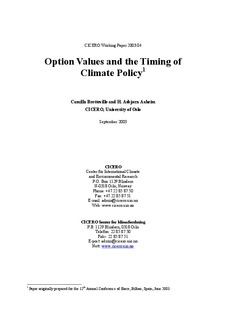Option values and the timing of climate policy
Working paper
Permanent lenke
http://hdl.handle.net/11250/192340Utgivelsesdato
2003Metadata
Vis full innførselSamlinger
- CICERO Working Papers [167]
Sammendrag
This paper reconsiders the importance of irreversibilities in climate change policy. The model presented here captures the irreversibility of both climate change due to greenhouse gas emissions and abatement technology investments, both of which are subject to uncertainty that will necessarily change gradually over time as a result of learning. The climate irreversibility adds an option value to the ‘early action’ strategy as long as there is a positive probability of encountering the climate irreversibility constraint. In contrast, irreversibility in abatement investments scales down the future climate effects in the same way as an increase in the discount factor would. The effect the option value of early abatement has on policy making is reduced the more irreversible investments are, but this effect decreases with the length of the time periods. The preferred policy option depends on the relative size of these option values and the possible adjustment costs. If the sum of the climate option value plus the adjustment costs resulting from too low initial abatement exceeds the sum of the investment option value plus the adjustment costs resulting from too high initial abatement, the net option value is positive, the climate irreversibility effect dominates, and ‘early action’ should be preferred over the ‘wait-and-see’ policy.
